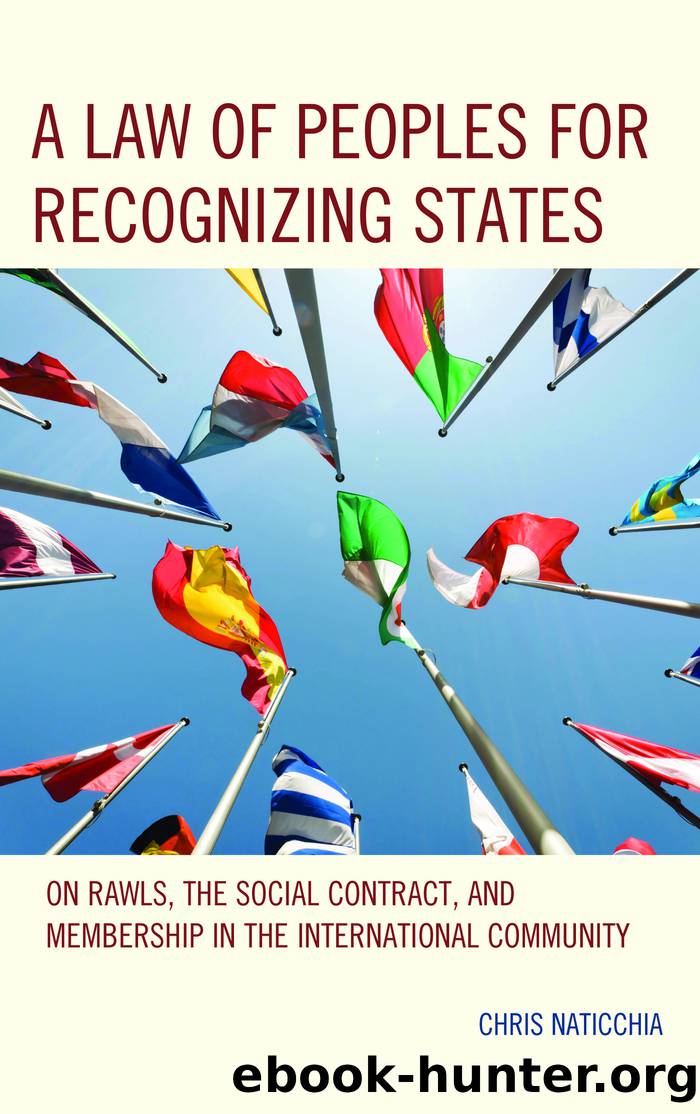A Law of Peoples for Recognizing States by Naticchia Chris;

Author:Naticchia, Chris;
Language: eng
Format: epub
Tags: undefined
Publisher: Lexington Books/Fortress Academic
Published: 2012-08-15T00:00:00+00:00
The Weak Standard
Perhaps one might want to object that this does not undermine all justice-based accounts, just ones that use the strong standard for minimal justice. What if we lower our standard and adopt the weak one instead?
But in Africa (excluding Morocco, Algeria, Tunisia, Libya, and Egypt, which were counted in the Middle East), less than one-third of the
countries would qualify for recognition under that standard. Under the most charitable interpretation of their political practices, only fifteen
countriesâBenin, Botswana, Burkina Faso, Cabo Verde, Comoros,
Gabon, Lesotho, Namibia, Niger, Sao Tome and Principe, Senegal,
Seychelles, Sierra Leone, Tanzania, and Togoâwould qualify (and four of them are located in the Atlantic or Indian Oceans).[38] The other thirty-
four countriesâincluding Angola, Chad, Rwanda, Sudan, Uganda, and
Zimbabwe, among othersâall fail to meet that standard, in most cases because of arbitrary arrests, torture, abuse, or extrajudicial killings committed by their security forces.[39] Africaâs UN membership would therefore drop from forty-nine to fifteen.
Again, we can only speculate about the impact that refusing to recognize this many countries would have on prospects for peace and justice in Africa. But the following seem like reasonable conjectures.
First, UN peacekeeping operations in Africa and elsewhere in the world would be significantly affected. Currently, nearly one-half of all UN peacekeepers come from Africa.[40] Yet over two-thirds of them would be ineligible to participate, since they come from countries that fail to meet the weak standard, which would render them ineligible to implement international law. In Africa, this would be particularly troublesome. Peacekeeping missions conducted there would be greatly complicated by barring so many soldiers, police, and observers from the region who possess the experience, cultural acuity, and language skills that are crucial for successful peacekeeping. In addition, the demographic makeup of troops eligible to participate would be much less likely to reflect that of Africaâsomething that would not only open the UN to charges of racial bias, but would also place these troops in greater danger, given the regionâs hostility and sensitivity to colonial domination. This in turn would alter the calculation in support of each specific mission.
Second, even if these limits on contributing troops could be overcome, the weak standard still implies that over two-thirds of Africaâs countries had no rights of territorial integrity or noninterference, and thus cannot validly claim that other entities act wrongly in taking their territory or interfering in their affairs. But if they cannot validly assert these claims, then the international community cannot justify corrective action by claiming that it is trying to right such wrongs. In Africa, where twenty-six countries experienced interstate war, internal conflict, major political or religious violence, or wars of independence during 2015 alone, this would clearly be troublesome.[41] Of course, we could always invoke a general duty of justice to authorize action that our policy of recognition fails to authorize. But then, as we saw earlier, even if this succeeds in containing the threats to peace and justice, it would be this duty, not our policy of recognition, that does the crucial normative work.
Under
Download
This site does not store any files on its server. We only index and link to content provided by other sites. Please contact the content providers to delete copyright contents if any and email us, we'll remove relevant links or contents immediately.
The European History Highway: A Guide to Internet Resources by Dennis A. Trinkle Scott A. Merriman(494)
The Seven Wonders of the Ancient World by Michael Denis Higgins(476)
European Security in a Global Context by Thierry Tardy(470)
European Security without the Soviet Union by Stuart Croft Phil Williams(469)
The Routledge companion to Christian ethics by D. Stephen Long Rebekah L. Miles(457)
Hudud Al-'Alam 'The Regions of the World' - a Persian Geography 372 A.H. (982 AD) by V. V. Minorsky & C. E. Bosworth(399)
Gorbachev And His Generals by William C. Green(391)
Get Real with Storytime by Julie Dietzel-Glair & Marianne Crandall Follis(390)
Tibetan Studies in Comparative Perspective by Chih-yu Shih Yu-Wen Chen(385)
Governance, Growth and Global Leadership by Espen Moe(381)
Hyperculture by Byung-Chul Han(377)
CliffsNotes on Fitzgerald's The Great Gatsby by Kate Maurer(360)
The Oxford History of the World by Fernández-Armesto Felipe;(353)
How Languages Are Learned 5th Edition by Patsy M Lightbown;Nina Spada; & Nina Spada(352)
The Egyptian Economy, 1952-2000 by Khalid Ikram(351)
Oral Poetry and Narratives from Central Arabia: The Poetry of Ad-Dindan : A Bedouin Bard in Southern Najd (Studies in Arabic Literature, Vol 17) (English and Arabic Edition) by P. M. Kupershoek P. Marcel Kurpershoek(343)
The Oxford Handbook of the Incas by Sonia Alconini(333)
Europe Contested by Harold James(319)
The Hutchinson Dictionary of Ancient and Medieval Warfare by Peter Connolly John Gillingham John Lazenby(305)
